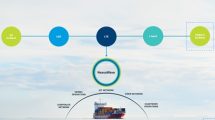 Thuraya Telecommunications Company unveiled its new Maritime Broadband (MBB) in May, claiming to meet the industry’s need for reliable equipment and cost-effective airtime. Currently available through its service providers, the offering is set apart from competitors by increased flexibility, smaller equipment and lower costs, which accommodate a range of budgets with a variety of price plans, says Kyle Hurst, Director of Market Development – Maritime at Thuraya.
Thuraya Telecommunications Company unveiled its new Maritime Broadband (MBB) in May, claiming to meet the industry’s need for reliable equipment and cost-effective airtime. Currently available through its service providers, the offering is set apart from competitors by increased flexibility, smaller equipment and lower costs, which accommodate a range of budgets with a variety of price plans, says Kyle Hurst, Director of Market Development – Maritime at Thuraya.
MBB provides standard IP throughput at up to 444kbps, and minimises traffic congestion in areas of high communications volume, such as busy shipping lanes and major ports, through dynamic resource allocation. Using the Thuraya network, which reportedly features the most powerful L-band services presently available to maritime users, the MBB can be used across the company’s satellite coverage footprint.
This means that while MBB is faster than FleetBroadband 500, which is capable of 432kbps broadband speed, Inmarsat offers global coverage. However, competitive pricing is a “compelling” factor, says Hurst.
“The pricing of our solution will be very compelling, offering unprecedented levels of value and allowing many who could not previously afford modern maritime communications capability to look to optimisation as a way of improving and refining their operations.
“The main differentiators we offer are better value, more flexibility and smaller equipment. The lower cost, more flexible packages and even smaller equipment for a higher throughput mean that there is ‘clear-water’ between what our competitor offer and what we have.”
Competition encompasses all maritime communications providers, irrespective of their offering L-band or VSAT solutions, says Hurst.
“Our value proposition is ‘a great maritime broadband solution at the right price.’ We are aiming to define the phrase ‘Game-Changing’ in the maritime sector.”
Revolutionary breakthrough
Thuraya’s new offering follows the last two years spent focused on the maritime vertical. The company has been committed to developing innovative products and services for the sector, says Hurst. This drive for innovation is not limited to the maritime vertical, however. In May, the company announced the formation of a new division dedicated to pushing development and innovation in all products, services and business models, a move that followed the successful launch of the SatSleeve.
“Thuraya has been working on building our maritime business over the last couple of years and will continue to do this in the future. We have made a major innovation this year already with the SatSleeve, which transforms an iPhone into a satellite phone. We are focusing on the maritime market to see how we can bring new innovative products and services into this sector to hopefully create some kind of revolutionary breakthrough in the industry.”
Handheld voice has, traditionally, been Thuraya’s strongest market, and for maritime, the previous success has mainly been in voice and simple data services, says Hurst, adding that the company is in a position to develop this further.
“Our satellites and network are capable of much more and as a business, we can deliver a really powerful communications capability at affordable packages. I think the real success for us will be in delivering satellite communications to those who need it most, not just those who have the biggest budgets.”
The key challenge faced in developing the MBB was in refining a technology that has been primarily focused on remote terrestrial communications so that it is suitable for the maritime industry, says Hurst.
“However, we worked closely with our service providers and believe that this solution provides the right services, value and reliability to give the maritime industry some real choice for maritime broadband communications.”
Merchant shipping is a main interest for Thuraya, particularly in the Middle East, Europe and Asia, says Hurst.
“We have also had success with offshore oil and gas service and leisure vessels so far, with over 200 currently using Thuraya MBB, so we expect this to continue growing. In short, the best response will be from markets that operate nationally or regionally and have a broadband requirement but are not willing to pay the higher prices for airtime and hardware that the competition offers.”
The healthiest response is expected to come from managed cargo vessels on one- or two-year contracts for short routes, explains Hurst.
“The jump in communications capability for the same cost as what they are currently paying for older technology means a big boost for ship-to-shore coordination and also allowing for quite complex monitoring of onboard operations and systems.”












Add Comment